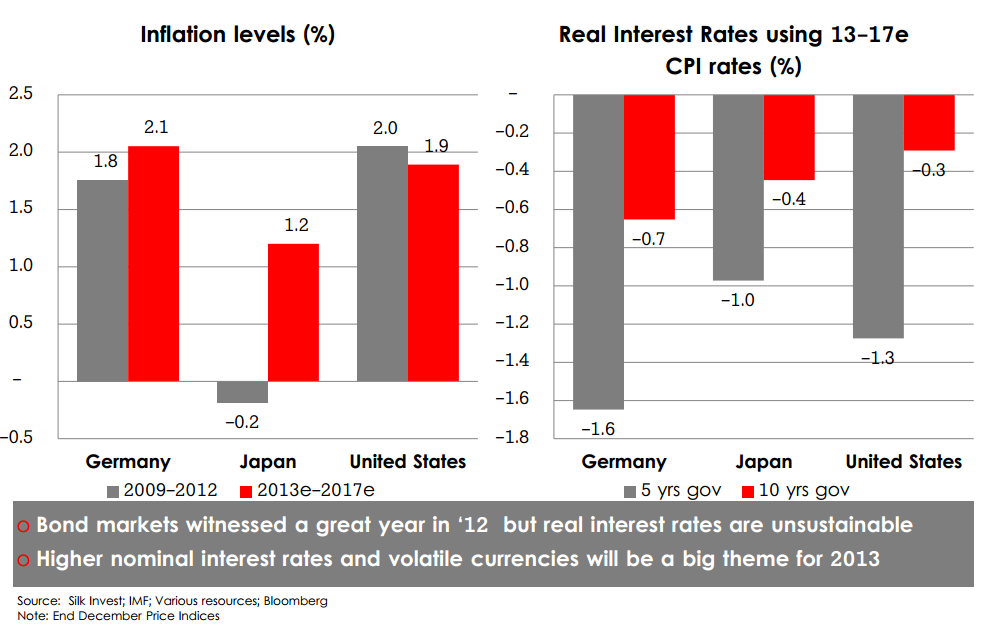Frontier Bonds and the case for exotic investments
Post on: 4 Июнь, 2015 No Comment

In college (15+ years ago), I had a chance to interview the legendary investor Jim Rogers, who had recently toured the world on a motorcycle looking for adventure and investment opportunities. He made the rather bold statement that the best time to invest is when there is blood running in the streets. Essentially, he was arguing that you want to be a buyer when everyone else is a seller.
However, I don’t think that Jim Rogers bought any frontier market bonds during his journey. In smaller, less developed nations, it makes much more sense to buy stocks in tumultuous circumstances. In a moment, I will get into the reasons why, but first I want to explain why this is important.
What are frontier bonds?
I had a phone call from a reporter this morning that was writing a story on frontier market bonds. She essentially told me that there had been a lot written on emerging market bonds and even frontier stock markets. She wanted to do something new and different.
Frontier market bonds are bonds issued by countries like Nigeria, Kenya, Vietnam, Pakistan, Egypt, and Argentina. To make an analogy, frontier bonds are to emerging market bonds what high yield bonds are to corporate bonds. They represent some of the riskiest investments in the emerging market debt universe.
The Argument For Frontier Bonds
The reporter for the story gave me the case for frontier bonds (which sounds a lot like the case for emerging market bonds in general. These countries have low debt to GPD ratios and good economic growth compared to the developed world. In short, the economic fundamentals are in general better than the United States and frontier bonds can pay much higher yields. For example, a U.S dollar denominated 15 year Venezuelan government bond is currently yielding 10.5%.
The Problem With Frontier Bonds
Political Instability Many frontier markets have a tremendous amount of political turmoil. For example, Nigeria, which has a large population and tremendous natural resources, is a tinderbox of political tensions between the North and South of the country. To quote The Economist, Sept 29th, 2012, “ Nigeria’s Insurgency: Hold Your Nose and Talk ”:
IF THE gravity of a conflict can be measured by the length of the guns employed, it is worth noting that soldiers at checkpoints in Nigeria’s north have started fixing bayonets to their barrels. More than 1,000 people have died in terror attacks there this year, an increase of more than 50% on 2011.
What would happen if the government of Nigeria was overthrown by rebels? Would the new government honor the debt commitments of the previous government? Maybe, but they could also opt for a fresh start. Politics is a major factor which comes into play when investing in frontier markets.
When it looked like the president of Venezuela, Hugo Chavez, would be thrown out of office, the value of Venezuelan bonds rose by close to 30%. With the election over and Chavez winning a decisive victory, Venezuelan bond prices have fallen back.
Impossible To Collect Most “frontier bonds” are government issued debt. If the government decided to default on the debt, there is very limited recourse for investors. At the end of 2001, the Republic of Argentina defaulted on its debt of $132 billion (US Dollars). This represented 1/7th of all emerging market debt at the time. Those investors are still waiting to be paid. You may have heard the story recently of US investors repossessing an Argentinian navy ship in a foreign port. While its a nice ship and may be worth $20 million, this “recovery” is a symbolic effort and not a practical one. There is a good chance with frontier bonds that the country will default, and investors will receive nothing.
There are other problems with frontier bonds. The countries issuing the bonds tend not to have economies that are not very diversified and are often commodity dependent. This means low commodity prices can have a severe impact on their economies.
The Big Picture
Every investment decision involves assessing risk versus rewards. When you buy a bond, there is limited upside. If everything goes well, the bond investor will receive interest and principal on the bond. Assuming the bond pays an 8% yield, the investors upside on the bond if held to maturity is 8% per year. Frontier bonds have all the risks of a normal bonds (in particular interest rate risk ) and political risks described above. To make matters worse, its very hard to assess the political situation in a frontier economy sitting in the United States. Quantifying the downside risk for a frontier bond is difficult. Given the limited upside, the difficulty in quantifying the risk, and the severity of a default, the risks seem to be greater than the potential to earn 3 or 4 percent more yield than an investment grade corporate bond.
On the other hand, frontier market stocks have much more upside potential than bonds and therefore may be the better place to look for opportunity.














